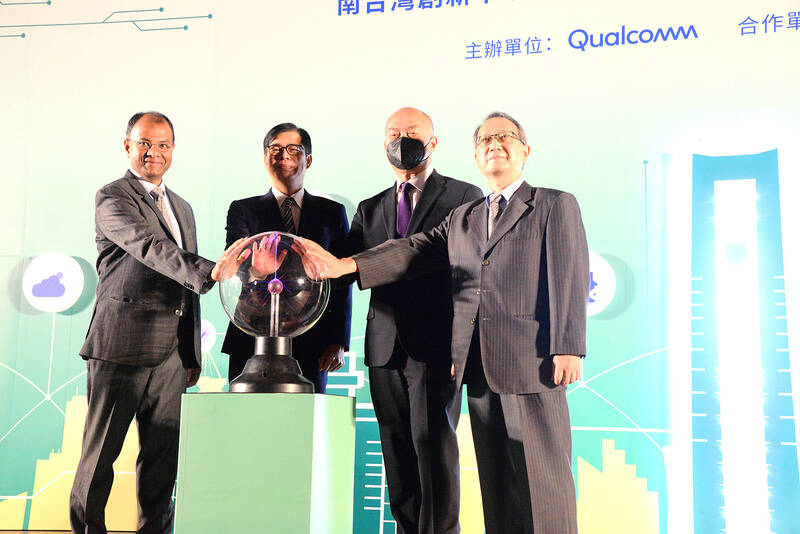Qualcomm Inc yesterday inaugurated a new innovation center in Kaohsiung as it steps up efforts to foster local start-ups and a 5G technology ecosystem in the city, following in the footsteps of its local partners.
The US chip company’s move fits the Kaohsiung City Government’s plan to build a semiconductor supply chain within the next five years, highlighted by Taiwan Semiconductor Manufacturing Co’s (TSMC, 台積電) first chip plant in the city.
TSMC plans to start building the factory by the end of this year, and to start production of 28-nanometer and 7-nanometer chips there in 2024.

Photo: Hsu Li-chuan, Taipei Times
Qualcomm said it had been considering setting up operations in Kaohsiung for the past two years, as it had found that more customers, partners and start-ups have expanded their operations to the city.
Some of the start-ups participating in the innovation challenges arranged by Qualcomm are from southern Taiwan, the company said.
“Some of our partners have started building their operations in Kaohsiung, such as Compal Electronics Inc (仁寶), which unveiled a 5G AIoT [artificial Internet of Things] research center in August,” Qualcomm Taiwan president S. T. Liew (劉思泰) told reporters in Kaohsiung.
“With our partners and start-ups thriving in southern Taiwan, we have to be here with them,” Liew said.
With the new Qualcomm Innovation Center, Southern Taiwan, Liew said the company aims to provide incubation support to start-ups, including business instructions, talent training, and advanced testing labs supporting 5G AIoT, O-RAN, small-cell base stations and robotics tests.
Qualcomm would also share its knowledge with the start-ups regarding patent applications, commercialization and technology support, he said.
Some start-ups have entered Qualcomm’s supply chain after joining programs created by Qualcomm’s Taipei Innovation Center, Liew said.
The innovation center in the Asia New Bay Area 5G AIoT Innovation Park in Kaohsiung is its second one in Taiwan.
The company has also set up similar innovation centers in Vietnam and India, given the robust start-up and technology ecosystems in those countries, Qualcomm vice president Sudeepto Roy told reporters.
Qualcomm has tripled its workforce in Taiwan to about 1,500 from about 500 since Liew took the company’s reins in 2016 to support its rapid business expansions.
The company is recruiting engineers specialized in software and hardware design, it said.

CHIP RACE: Three years of overbroad export controls drove foreign competitors to pursue their own AI chips, and ‘cost US taxpayers billions of dollars,’ Nvidia said China has figured out the US strategy for allowing it to buy Nvidia Corp’s H200s and is rejecting the artificial intelligence (AI) chip in favor of domestically developed semiconductors, White House AI adviser David Sacks said, citing news reports. US President Donald Trump on Monday said that he would allow shipments of Nvidia’s H200 chips to China, part of an administration effort backed by Sacks to challenge Chinese tech champions such as Huawei Technologies Co (華為) by bringing US competition to their home market. On Friday, Sacks signaled that he was uncertain about whether that approach would work. “They’re rejecting our chips,” Sacks

NATIONAL SECURITY: Intel’s testing of ACM tools despite US government control ‘highlights egregious gaps in US technology protection policies,’ a former official said Chipmaker Intel Corp has tested chipmaking tools this year from a toolmaker with deep roots in China and two overseas units that were targeted by US sanctions, according to two sources with direct knowledge of the matter. Intel, which fended off calls for its CEO’s resignation from US President Donald Trump in August over his alleged ties to China, got the tools from ACM Research Inc, a Fremont, California-based producer of chipmaking equipment. Two of ACM’s units, based in Shanghai and South Korea, were among a number of firms barred last year from receiving US technology over claims they have

BARRIERS: Gudeng’s chairman said it was unlikely that the US could replicate Taiwan’s science parks in Arizona, given its strict immigration policies and cultural differences Gudeng Precision Industrial Co (家登), which supplies wafer pods to the world’s major semiconductor firms, yesterday said it is in no rush to set up production in the US due to high costs. The company supplies its customers through a warehouse in Arizona jointly operated by TSS Holdings Ltd (德鑫控股), a joint holding of Gudeng and 17 Taiwanese firms in the semiconductor supply chain, including specialty plastic compounds producer Nytex Composites Co (耐特) and automated material handling system supplier Symtek Automation Asia Co (迅得). While the company has long been exploring the feasibility of setting up production in the US to address

OPTION: Uber said it could provide higher pay for batch trips, if incentives for batching is not removed entirely, as the latter would force it to pass on the costs to consumers Uber Technologies Inc yesterday warned that proposed restrictions on batching orders and minimum wages could prompt a NT$20 delivery fee increase in Taiwan, as lower efficiency would drive up costs. Uber CEO Dara Khosrowshahi made the remarks yesterday during his visit to Taiwan. He is on a multileg trip to the region, which includes stops in South Korea and Japan. His visit coincided the release last month of the Ministry of Labor’s draft bill on the delivery sector, which aims to safeguard delivery workers’ rights and improve their welfare. The ministry set the minimum pay for local food delivery drivers at